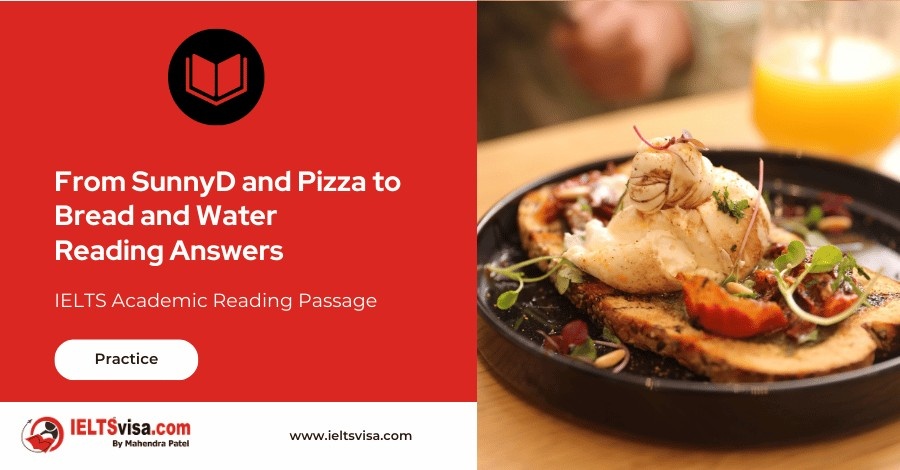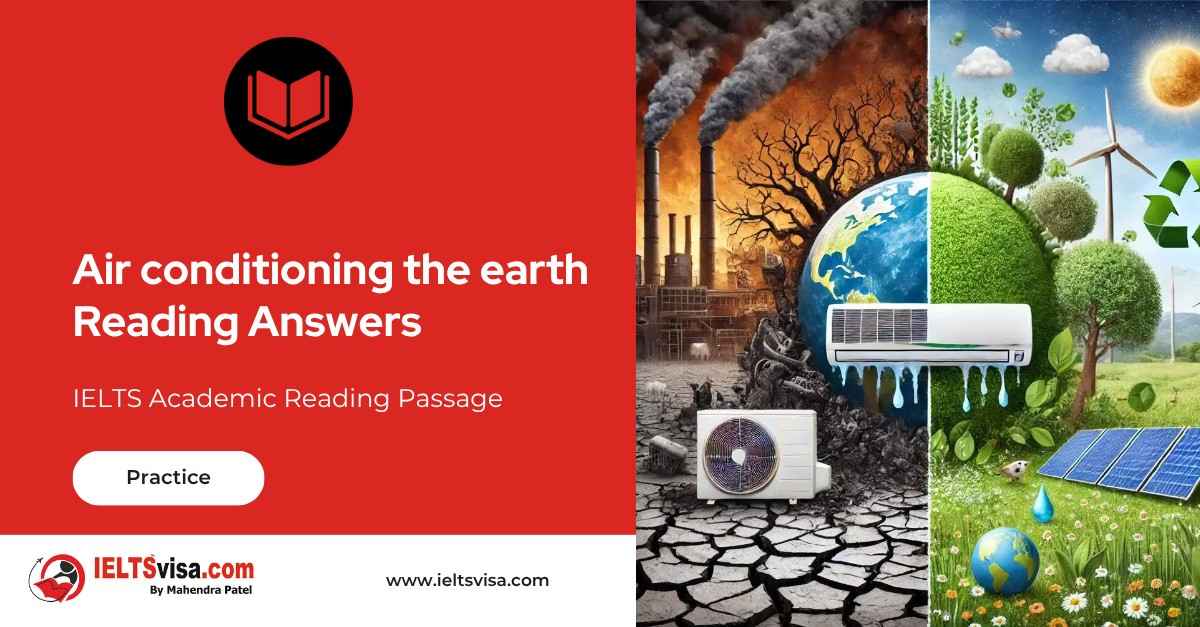From SunnyD and Pizza to Bread and Water Reading Answers
IELTS Academic Reading Passage
A. Another bad week in a bad month for the food and drink industry. Sunny Delight, formerly the UK’s third largest selling drink, is to be taken off the shelves by Asda after plummeting sales, the supermarket said at the weekend. Yesterday, it was the turn of Northern Foods, makers of biscuits, pies, pizzas and ready meals, to admit that the trend to healthier food was causing it problems. The company’s chief executive, Pat O’Driscoll, issued its second profits warning in two months as its biscuit sales slumped by 12% year on year in January and February, and pastry sates by 11%. Shares fell 17% to a five-year low of £1.08p.
B. The National Consumer Council’s food expert, Sue Dibb, said the news showed companies would have to change to survive. “It looks as though we’ve reached the tipping point on food. Our research showed that two thirds of consumers have made changes to what they eat in the last year. Supermarkets are getting competitive about health. Companies are having to wake up or lose their customers.” Foods analyst Clive Black, of Shore Capital, said that a “sea change” in eating habits was behind the industry’s problems. “Anyone who hasn’t realised over recent years that fruit and veg are good and doughnuts and cream cakes are bad must have been living on the moon,” he said. “But over the past year or so, the penny really seems to have dropped.”
C. Like other supermarket groups, Asda said it had seen a marked change in buying patterns in the past year. “Customers want more natural and authentic products,” Jon Bett, the trading manager for chilled drinks, said. “The market for carbonated drinks has declined 7 to 8% in the last year, while the juice market has doubled and water sales have grown phenomenally.” The trend had been driven by media coverage and the “Jamie Oliver effect”, he added.
D. The decline of Sunny Delight is matched by the fall of other soft drinks – two weeks ago, Britvic admitted a “severe decline” in sales of its carbonated drinks, which include Tango, 7UP and Pepsi – although the fate of the SunnyD brand has attracted particular schadenfreude. Sunny Delight burst on to the market in 1998 and reached the league table of top brands in 1999 by selling itself as a healthy drink, although its original recipe was only 5% juice with plenty of sugar and water as well as vegetable oil, thickeners, added vitamins, flavourings, and colourings.
E. The health watchdog the Food Commission accused then owners Procter and Gamble of a con for selling it from fridge cabinets. In 1999, paediatrician Duncan Cameron reported a new and alarming condition in the medical journals: Sunny Delight Syndrome. A girl of five had turned bright yellow after drinking five litres a day. She was overdosing on beta-carotene, the additive used to give the drink its orange colour, and the pigment was being deposited in her skin. The marketing dream turned to a nightmare: by coincidence television adverts at the time showed two white snowmen raiding the fridge for SunnyD and turning bright orange. Its collapse was as dramatic as its rise to fame, and Gerber Foods Soft Drinks, which bought distribution rights to the brand in 2005, has been unable to reverse its fortunes despite efforts to reduce the sugar content, change the recipe, and introduce new variations, including a bright green apple and kiwi flavour.
F. Kath Dalmeny, the Food Commission’s senior policy adviser, greeted the news of SunnyD’s delisting with satisfaction. “There is no appetite any more for products that claim to be healthy but have no real nutritional value. Sunny Delight didn’t live up to its claims and parents have seen through that kind of marketing.” Gerber Funds Suit Drinks said SunnyD was suffering from an inherited and unjustified image problem. The marketing director, Rob Spencer, told The Grocer magazine: “In Asda, two thirds of our sales come from no added sugar versions, which are up by 1% year on year.”
G. But market research figures from the company AC Nielsen show that the pressure on Sunny Delight and Northern Foods is part of a wider trend. Sales of pizzas and frozen foods fell by 9.2% last year. Most products seen as unhealthy declined – confectionery by 3.1%/bagged snacks by 1.2%, and carbonated soft drinks by 1.7% – while those seen as healthy boomed. Drinking yoghurts were up 51%, juices 15.6%, and water 9.4%. Ethical investment analysts EIRIS recently listed leading food manufacturers according to the percentage of turnover derived from products which fall into the unhealthy category. It said Unilever, Kraft Foods, PepsiCo, Coca-Cola, McDonald’s, and Cadbury Schweppes had the highest risk of suffering a backlash.
Questions 1-4
The text has 7 paragraphs (A – G).
Which paragraph contains each of the following pieces of information?
1 ___________ Most consumers have changed their eating habits over the last year.
2 ___________ The suggestion that parents are more aware of how advertisers try to sell products
3 ___________ The ingredients of a once-popular drink
4 ___________ A description of an advertisement
Questions 5-8
Complete the following sentences using NO MORE THAN TWO WORDS from the text for each gap.
Shops are becoming more 5 _________________ about stocking healthy food and drink products.
Sunny Delight was originally marketed as a 6 _________________
Gerber Foods Soft Drinks has the 7 _________________ for Sunny Delight.
The most dramatic change in consumption has been for 8 _________________
Questions 9-13
Do the following statements agree with the information given in Reading Passage 1?
In boxes 9 -13 on your answer sheet, write
|
TRUE |
if the statement agrees with the information |
|
FALSE |
if the statement contradicts the information |
|
NOT GIVEN |
If there is no information on this |
9 _________________ Most of the foods produced by Northern Foods are healthy.
10 _________________ Duncan Cameron is a doctor.
11 _________________ Rob Spencer works for Asda.
12 _________________ Sales of Coca-Cola are declining in Britain.
13 _________________ Fast food companies are looking to developing countries to increase their profits.

Solution For: From SunnyD and Pizza to Bread and Water
Reading Answers
| 1 B | 2 F |
| 3 D | 4 E |
| 5 competitive | 6 healthy drink |
| 7 distribution right | 8 drinking yoghurts |
| 9 FALSE | 10 TRUE |
| 11 TRUE | 12 NOT GIVEN |
| 13 NOT GIVEN |
Review and Practice
- Regularly practice with IELTS reading samples and time yourself to get used to the pressure of the exam.
- Review your mistakes to understand where you went wrong and how to avoid similar errors in the future.
Our Books
Master IELTS Speaking Part 1
IELTS Writing Task 1 Book
IELTS Writing Task 2 Book
From SunnyD and Pizza to Bread and Water Reading Answers Explanation
Comin Soon
Practice IELTS Other Modules
IELTS Listening
The IELTS Listening test assesses how well you can understand spoken English in various contexts. It lasts about 30 minutes and is divided into four sections with a total of 40 questions. The listening tasks become increasingly difficult as the test progresses.
IELTS Academic Reading
The IELTS Academic Reading section assesses your ability to understand and interpret a variety of texts in academic settings. It is designed to evaluate a range of reading skills, including skimming for gist, reading for main ideas, reading for detail, understanding inferences, and recognizing a writer's opinions and arguments.
IELTS Speaking
The IELTS Speaking test assesses your ability to communicate in English on everyday topics. It lasts 11-14 minutes and consists of three parts: introduction, cue card, and a discussion based on the cue card topic.
IELTS General Reading
IELTS General Reading tests your ability to understand and interpret various types of texts. Here are some key areas and types of content you can expect to encounter in the reading section, along with tips for effective preparation.
IELTS Academic Writing Task 1
In IELTS Academic Writing Task 1, you are presented with a visual representation of information, such as graphs, charts, tables, or diagrams, and you are required to summarize, compare, or explain the data in your own words.
IELTS General Writing Task 1
In IELTS General Writing Task 1, you are required to write a letter based on a given situation. The letter can be formal, semi-formal, or informal, depending on the prompt. Here’s a breakdown of the key components to include in your letter
IELTS Academic Writing Task 2
In IELTS Academic Writing Task 2, you are required to write an essay in response to a question or topic. Here’s a guide to help you understand the essential elements of this task
IELTS Exam Tips
To succeed in the IELTS exam, practice regularly, familiarize yourself with the test format, improve your vocabulary, develop time management skills, and take mock tests to build confidence.
Grammer for IELTS
Grammar is the foundation of effective communication in English. Understanding tense usage, subject-verb agreement, and sentence structure enhances clarity and coherence in writing and speaking.
Vocabulary for IELTS
Vocabulary plays a crucial role in the IELTS (International English Language Testing System) exam, especially in the Speaking and Writing sections. Here’s an overview of why vocabulary is important and how it impacts your performance
RECENT IELTS SAMPLES QUESTIONS AND ANSWERS
Walking with dinosaurs
Peter L. Falkingham and his colleagues at Manchester University are developing techniques that...
Money as the Unit of Amount Reading Answers
The most difficult aspect of money to understand is its function as a unit of account. In...
WEATHERING IN THE DESERT
In the deserts, as elsewhere, rocks at the earth's surface are changed by weathering, which...
Nature on Display in American Zoos
The first zoo in the United States opened in Philadelphia in 1874, followed by the Cincinnati...
Can We Prevent the Poles From Melting
Such is our dependence on fossil fuels, and such is the volume of carbon dioxide we have...
Air conditioning the earth reading answers
The circulation of air in the atmosphere is activated by convection, the transference of heat...













